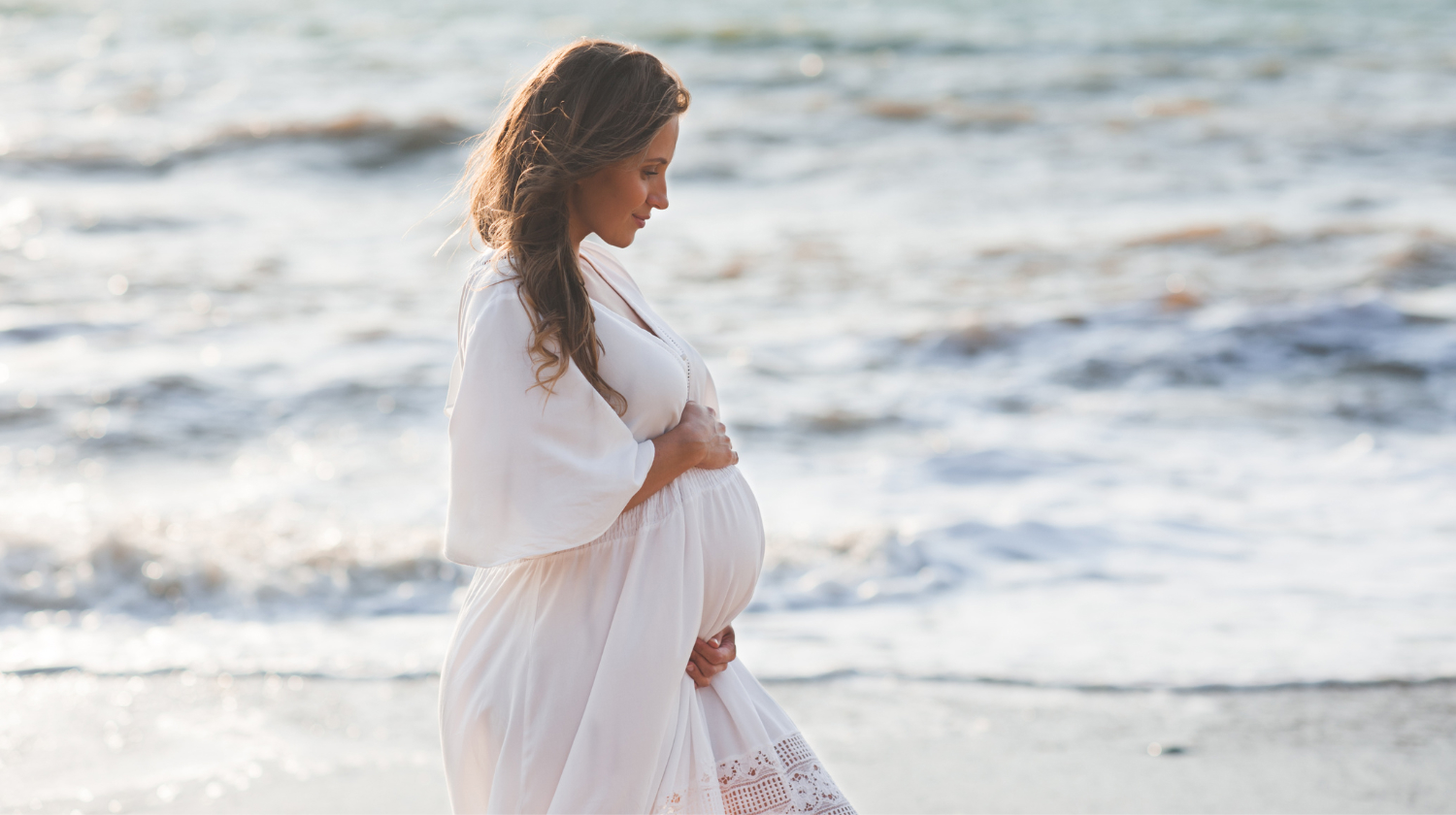First Trimester Of Pregnancy: Symptoms & Baby Growth 2024

So many questions pop through your head when you first consider having a baby. You might be wondering what and how much to eat, what to stay away from, and what to expect in terms of weight gain, symptoms, and fetal development.
The first trimester of pregnancy is full of ups and downs, especially for a first-time mom. With all the unexpected bodily changes, fears, and worries about the future, it’s easy to feel overwhelmed and concerned about what to expect.
If you’re wondering about what’s going to happen to your body and baby as soon as you get pregnant, this article has everything you need.
Changes To Your Body In The First Trimester
While first-trimester weight gain and morning sickness are well known, there are also other less-talked-about bodily changes[4] you might experience, such as:
- Heartburn.
- Frequent urination.
- Light spotting or bleeding.
- Tender and growing nipples and breasts.
- Milky white vaginal discharge.
- Gastrointestinal issues and constipation.
- Skin issues — acne, dark spots on face.
These are all common issues you can expect, and they will change from trimester to trimester. If anything makes you feel concerned, give your doctor a call to ensure everything’s normal.
First Trimester Emergency Symptoms
If you notice any of these specific symptoms, immediately call your doctor:
- Heavy bleeding.
- Extreme dizziness.
- Severe abdominal pain.
- Rapid weight gain or no weight gain or loss.
Some first-trimester bleeding and spotting are normal, but still important to document with your doctor. Heavy bleeding is a sign that requires medical attention. Any bleeding or cramping can be a sign of a first-trimester miscarriage, but it’s relative — the worse the bleeding or cramping, the more ominous it is. Miscarriages are very common and happen in about 26% of all pregnancies[5], with 80% occurring in the first trimester. Fortunately, the risk of miscarriage decreases after early pregnancy, i.e., after about 12 weeks after gestation.
Baby’s Development In The First Trimester
A pregnancy lasts about 40 weeks, which are grouped into three trimesters of about three months each. The first is from the moment of conception, where the egg is fertilized by the sperm, until the twelfth week of pregnancy. The fetus begins to grow from the moment of fertilization, with developments quickly changing[1] week by week.
Here is how the baby develops in the first trimester of pregnancy:
Month One
- The amniotic sac, placenta, and umbilical cord develop.
- Tubes that form into the circulatory system, brain, and spinal cord form.
- The face, mouth, and spaces for eyes begin to take shape.
- The embryo becomes a quarter-inch long.
Month Two — Embryonic Period
- Major organs begin to develop; the legs, arms, lungs, heart, and ears.
- Bones begin to build.
- Facial feature form; the nose, mouth, and face.
- The embryo becomes a fetus[2] about 1 inch long at eight weeks.
Month Three — Fetal Period Begins
- Fingers, toes, and nails take form.
- The vagina or penis takes shape.
- Urinary and digestive system function.
- The baby begins to move and opens its hands and mouth.
- A first-trimester ultrasound[3] is done to document fetal well-being and listen to the fetal heart.
- The fetus grows between 3 inches to 4 inches long and weighs 1 ounce.
In order for your body to keep up with all these developments, you’ll likely need a prenatal multivitamin. Most include at least 400 micrograms of folic acid, which is the minimum necessary to help the baby’s brain and spinal cord grow properly. Ask your doctor for recommendations and to check for any other nutritional deficiencies you may need supplements for.
First Trimester Pregnancy Symptoms
The first trimester of pregnancy can bring drastic and unexpected symptoms, especially exhaustion. Many pregnant women will tell you it feels like they’ve been running a marathon every day and they can barely get out of bed in the morning. Others, however, might have only mild symptoms and feel the time pass easily and quickly. There’s no way to know exactly what you’ll experience, but these are some of the most common symptoms[6] you might notice:
- Headaches.
- Exhaustion.
- Mood swings.
- Nausea and vomiting.
- Metallic taste in your mouth.
- Food cravings and revulsions.
- Heightened sensitivity to smell and taste.
- Bloating, cramps, and constipation.
First Trimester Depression
Some pregnant women may also fall into a depression during their pregnancy[7], especially those in low and middle-income households. Since pregnancy can come with many added worries and stress, it’s no wonder it hits harder during a time of great change and financial strain. Some signs and symptoms of pregnancy depression include:
- Poor weight gain.
- Inability to feel pleasure or joy.
- Difficulty taking care of yourself.
- Use of alcohol, drugs, or cigarettes.
- Excessive worrying about your pregnancy or baby.
- Little response to help or reassurance.
- Thoughts of suicide.
If you’ve noticed any of these symptoms, talk to a friend and reach out to a support group or therapist for help. Many support groups offer free services, and online therapists can also offer discounted rates. For any thoughts of suicide, call or chat online with the suicide and crisis lifeline at 988 or text HOME to 741741.
What To Avoid During The First Trimester
Doctors and nutritionists recommend certain lifestyle changes to help encourage healthy fetal development, along with an easier pregnancy for the mom. Here’s a small list of what to avoid to create the healthiest and smoothest pregnancy possible for yourself and your baby:
Unhealthy Diet

The old saying, you are what you eat, couldn’t be more evident than during the time of fetal development, where nutritional deficiencies greatly affect the baby’s current and future physical and mental state. Even if you take a prenatal vitamin, the body needs fiber, macro-, and micronutrients from natural whole food sources to ensure proper digestion and nutrient usage for both the baby and mom.
Quick Tips For A Healthy Diet
- Add a serving of vegetables to every lunch and dinner.
- Have a piece of fruit after every meal or as a snack.
- Swap white bread for whole grain.
- Swap red meat for fish, chicken, and legumes.
- Try cooking one big healthy meal a week for leftovers.
- Snack on hummus and veggies instead of processed foods.
- Have yogurt and fresh fruit with mixed nuts for breakfast, snacks, or dessert daily.
Of course, it’s not always easy to eat a 100% healthy whole foods diet. There’s no need to put pressure on yourself to eat perfectly, either. Instead, aim to eat nutrient-dense foods the majority of the time, and still allow yourself to eat other less healthy favorites now and then.
Smoking, Alcohol, Or Drugs

Cigarettes[8] are carcinogenic and toxic to both mom and baby, leading to fetal and behavioral disorders and miscarriages. Alcohol[9] also has severe effects, including growth retardation, congenital defects, behavior anomalies, and miscarriage. Substance abuse[10] can kill both the baby and mom, cause premature labor, and have many pregnancy complications and undesirable effects on the fetus.
If you or someone you know is struggling, offer a helping hand without judgment. Anyone with a history of substance abuse knows quitting isn’t easy, especially during times of increased stress and change. There are many free and 24-hour hotlines available: don’t be afraid to reach out for help. With support, anything is possible.
Sedentary Lifestyle

It’s a myth that you shouldn’t exercise when pregnant. Unless a doctor tells you otherwise, it will help keep your energy levels up[11], reduce depression, excess weight gain, backaches or headaches, bloating, and constipation, and help you sleep better. As for the baby, it can create a healthy gestational age-appropriate birth weight[12], improved neurodevelopment and cardio health, even smoother labor, easier birth, and lessening of the risk of a C-section. Aim to stay below 90% of your maximum heart rate and intensity to avoid injury.
Social Isolation

First trimester weeks can come with lethargy, depression, and worry, which can make it difficult to want to see people. But making time to see loved ones can decrease stress and help you feel supported and better able to manage your pregnancy. Friends and social support[13] offer some of the biggest boosts to mental health and well-being. If you don’t feel you have anyone to turn to, try online or search for in-person support groups near you.
Stress

With all the added worries that come with having a baby, you might begin to feel more stressed than usual. Even if you’re excited about becoming a mom and want a baby, a million to-do lists before the baby is born are probably piling up in your mind. When you start to notice yourself becoming overly preoccupied and worried, it’s time to take a step back and do something calming for yourself. You can also think of different self-care activities you can do daily to help keep you less stressed overall, such as:
- Nature walks.
- Breathing exercises.
- Meditation and yoga.
- Free writing and journaling.
- Creative drawing, painting, dancing, etc.
- Calming bedtime and morning routine.
- Join an online Mindfulness-Based Stress Reduction Program.
Creating a routine and taking care of yourself while going through a time of difficult changes can help you feel safer and more secure. You’ll be better able to manage the stressors of the day if you take some regular downtime for yourself. It’s not easy, but if you can schedule even a few minutes a day to do something calming, you’ll be able to reduce symptoms of anxiety and depression. Cortisol, the stress hormone, can complicate pregnancy[14] over time, so taking steps to reduce it is prudent.
What About Sex?
Many women worry about whether or not sexual activity is appropriate or even safe during pregnancy. If you are experiencing a normal pregnancy under appropriate prenatal care, sex is permissible at any time during your pregnancy — except in the delivery room!
The Bottom Line
The first few months of pregnancy can be overwhelming, exciting, and even scary time for many women. There are many bodily changes that will happen, like gaining weight, bloating, peeing often, and feeling constipated. You might also get mood swings and develop depression, thanks to pregnancy hormones or hormone shifts.
Throughout all these difficult changes, it’s important to eat mostly nutrient-dense foods, exercise, and de-stress however you can. You and your baby will need lots of rest, nutrition, and support from friends and family or support groups to flourish and grow. Taking care of yourself can make your pregnancy go more smoothly and comfortably while increasing the chances of having a full-term pregnancy and healthy baby.
If you’re ever in doubt, search online for support groups and a medical or mental healthcare provider near you that can answer any questions or concerns about your pregnancy.
+ 14 sources
Health Canal avoids using tertiary references. We have strict sourcing guidelines and rely on peer-reviewed studies, academic researches from medical associations and institutions. To ensure the accuracy of articles in Health Canal, you can read more about the editorial process here
- Cleveland Clinic. (2022). First Trimester Of Pregnancy: What To Expect. [online] Available at: https://my.clevelandclinic.org/health/articles/9699-first-trimester
- Medlineplus.gov. (2020). Fetal development: MedlinePlus Medical Encyclopedia. [online] Available at: https://medlineplus.gov/ency/article/002398.htm
- Cleveland Clinic. (2022). Doppler Ultrasound: What Is It, Purpose and Procedure Details. [online] Available at: https://my.clevelandclinic.org/health/diagnostics/22715-doppler-ultrasound
- Mayo Clinic. (2022). 1st trimester pregnancy: What to expect. [online] Available at: https://www.mayoclinic.org/healthy-lifestyle/pregnancy-week-by-week/in-depth/pregnancy/art-20047208
- Dugas, C. and Slane, V.H. (2022). Miscarriage. [online] Nih.gov. Available at: https://www.ncbi.nlm.nih.gov/books/NBK532992/
- NHS Choices (2023). Week-by-week guide to pregnancy. [online] Available at: https://www.nhs.uk/start4life/pregnancy/week-by-week/1st-trimester/week-4/
- Mayo Clinic. (2022). Understand the symptoms of depression during pregnancy. [online] Available at: https://www.mayoclinic.org/healthy-lifestyle/pregnancy-week-by-week/in-depth/depression-during-pregnancy/art-20237875
- Oup.com. (2023). [online] Available at: https://academic.oup.com/ntr/article/6/Suppl_2/S125/1013941
- Jstor.org. (2023). Consumption of Alcohol During Pregnancy: A Review of Effects on Growth and Development of Offspring on JSTOR. [online] Available at: https://www.jstor.org/stable/41463389
- Kuczkowski, K.M. (2007). The effects of drug abuse on pregnancy. Current Opinion in Obstetrics & Gynecology, [online] 19(6), pp.578–585. doi:10.1097/gco.0b013e3282f1bf17.
- Mayo Clinic. (2021). Pregnancy and exercise: Baby, let’s move! [online] Available at: https://www.mayoclinic.org/healthy-lifestyle/pregnancy-week-by-week/in-depth/pregnancy-and-exercise/art-20046896
- Prather, H., Spitznagle, T. and Hunt, D. (2012). Benefits of Exercise During Pregnancy. PM&R, [online] 4(11), pp.845–850. doi:10.1016/j.pmrj.2012.07.012.
- Reblin, M. and Uchino, B.N. (2008). Social and emotional support and its implication for health. Current Opinion in Psychiatry, [online] 21(2), pp.201–205. doi:10.1097/yco.0b013e3282f3ad89.
- Evans, L.M., Myers, M.M. and Monk, C. (2008). Pregnant women’s cortisol is elevated with anxiety and depression — but only when comorbid. Archives of Women’s Mental Health, [online] 11(3). doi:10.1007/s00737-008-0019-4.



